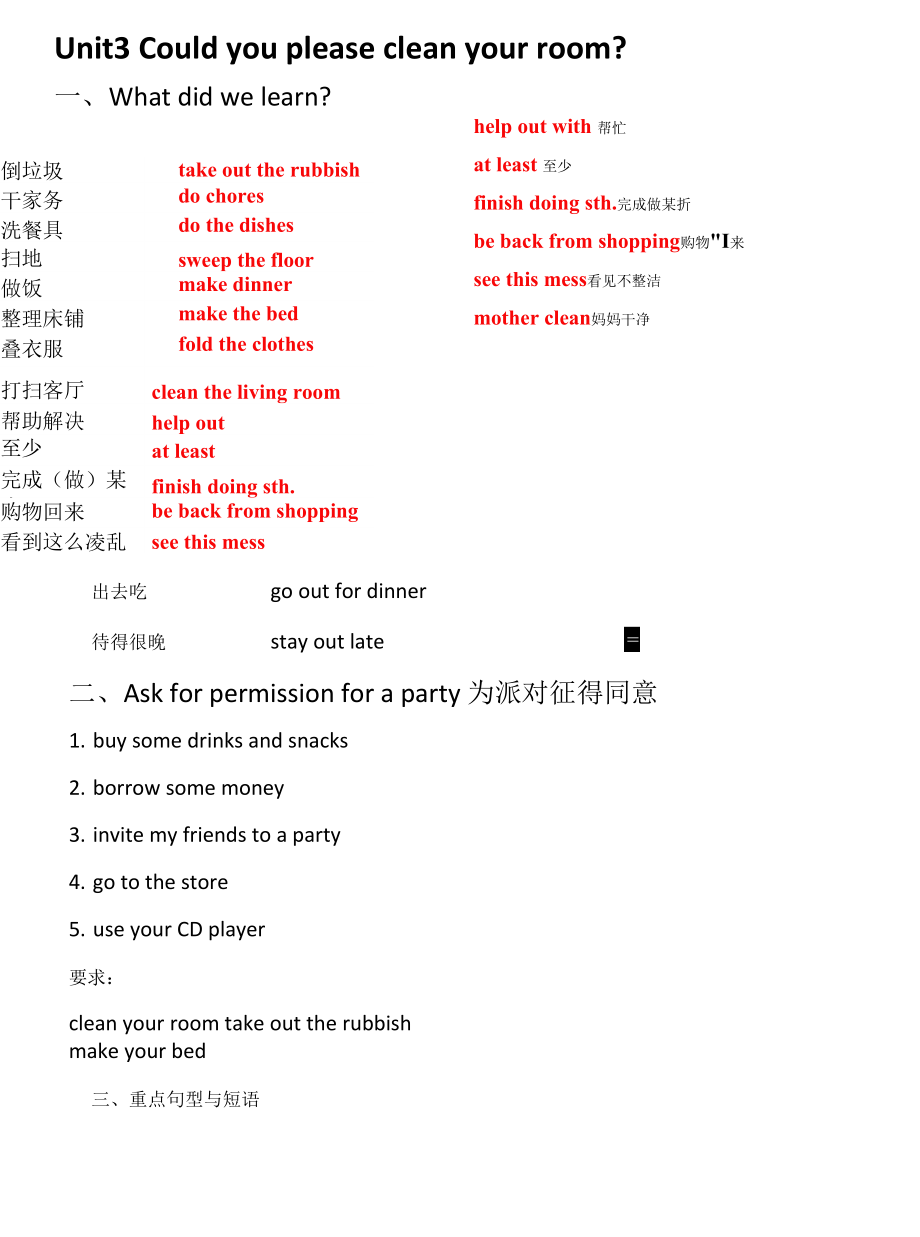《Unit3單元復(fù)習(xí)學(xué)案 人教版八年級(jí)英語(yǔ)下冊(cè)》由會(huì)員分享��,可在線(xiàn)閱讀�,更多相關(guān)《Unit3單元復(fù)習(xí)學(xué)案 人教版八年級(jí)英語(yǔ)下冊(cè)(8頁(yè)珍藏版)》請(qǐng)?jiān)谘b配圖網(wǎng)上搜索。
1���、Unit3 Could you please clean your room?
一��、What did we learn?
倒垃圾
take out the rubbish
干家務(wù)
do chores
洗餐具
do the dishes
掃地
sweep the floor
做飯
make dinner
整理床鋪
make the bed
疊衣服
fold the clothes
打掃客廳
clean the living room
幫助解決
help out
至少
at least
完成(做)某事
finish doing sth.
購(gòu)物回來(lái)
2����、be back from shopping
看到這么凌亂
see this mess
help out with 幫忙
at least 至少
finish doing sth.完成做某折
be back from shopping購(gòu)物"I來(lái)
see this mess看見(jiàn)不整潔
mother clean媽媽干凈
出去吃 go out for dinner
=i
待得很晚 stay out late
二��、Ask for permission for a party 為派對(duì)征得同意
1. buy some drinks and snacks
2.
3�����、borrow some money
3. invite my friends to a party
4. go to the store
5. use your CD player
要求:
clean your room take out the rubbish
make your bed
三、重點(diǎn)句型與短語(yǔ)�
1. Peter, could you please take out the rubbish?彼么L 請(qǐng)?bào)荆?
倒一下垃圾好嗎�?
I
Could you please...,這是禮貌地提出請(qǐng)求的一種句型。
could不表示過(guò)去��,而是表示委婉��、客氣的語(yǔ)氣���,plea
4�、se后
應(yīng)接動(dòng)詞原形����。
2. Sorry. going to work on it now.對(duì)不起。我現(xiàn)在就要川
它工作�。
work on是一個(gè)動(dòng)詞短語(yǔ),on為介詞�,表示“從事某項(xiàng)工作;
做某項(xiàng)工作/研究�;創(chuàng)作作品、作畫(huà)等”�。
3. help out with sth 幫忙做某事/help sb out幫助某人
4. at least We should brush our teeth at least twice a week.
3. It is the parents9 job to provide a clean and comfortable
environment
5、at home for their children.為孩子們提供千凈����、
停造的家庭環(huán)境是父母的工作��。
provide作動(dòng)詞,意為“提供�;供應(yīng)”,其后常接名詞或代
訶作賓語(yǔ)�,常川結(jié)構(gòu):provide sb. with sth.o
4. The minute I sat down in front of the TV, my mom came
over.我剛坐在電視前,媽媽就過(guò)來(lái)了�����。
(1) the minute (that)...意為"一* 就 ”���,引導(dǎo)時(shí)間狀語(yǔ)
從句�����,相當(dāng)于as soon as����。
“過(guò)來(lái)“��。
5. For one week, she did not do a
6�����、ny housework and neither
did I.二周時(shí)間,她沒(méi)有做任何家務(wù)�����,我也沒(méi)有做�。
f “neither+助動(dòng)詞/系動(dòng)詞/情態(tài)動(dòng)詞+主語(yǔ)”表示上句否定的
情況也適合于后者。
【銜接】:“so+助動(dòng)詞/系動(dòng)詞(be)/情態(tài)動(dòng)詞+主語(yǔ)”表示后
而的主語(yǔ)“亦如此���,也同樣”�����,說(shuō)明前而的肯定情況同樣也
適用于后者����。前面的主語(yǔ)和后而的主語(yǔ)不是同一個(gè)人物�����。
——You watched TV last night.你們昨晚看了電視���。
一So did the children.孩子們也看了���。�
6. Housework is a waste of their time.做家
7����、務(wù)是在浪費(fèi)他們
的時(shí)間��。
a waste of...為固定短語(yǔ)�,waste在這里作名詞���。
7. They should spend their time on schoolwork in order to
get good grades and get into to a good university.為了 取得好
成績(jī)��,進(jìn)入二所好大笑他們應(yīng)該把時(shí)間花在學(xué)業(yè)上��。
1) spend其主語(yǔ)必須是人�����,常用于spend some time/money on
sth或spend some time/money (in) doing srh.結(jié)構(gòu)中
2) in order to后接動(dòng)詞原
8��、形��,表示目的����,意為“為了……
8.1 think it is important for children to learn how to do chores
and help their parents with housework.我認(rèn)為對(duì)孩了們來(lái)說(shuō)學(xué)
習(xí)如何做家務(wù)和幫助父母做家務(wù)是很重要的�。
1) “It is+形容詞+ (for sb+)to do sth."為固定句型,其中sb
為賓格代詞或名詞����,表示“(對(duì)某人來(lái)說(shuō))做某事是……的
",It為形式主語(yǔ)�����。
2) how to do chores在此句中用作learn的賓語(yǔ)��。在賓語(yǔ)從句
中�����,含有疑問(wèn)代詞/副詞引導(dǎo)的從句可改
9��、為“疑問(wèn)詞+不定式
”結(jié)構(gòu)��。
9. The earlier kids learn to be independent, the better it is for
their future.孩子們?cè)皆鐚W(xué)會(huì)獨(dú)立��,對(duì)他們的未來(lái)就越好���。
“the+比較級(jí)...��,the+比較級(jí)...”意為“越 越 ”�。
10. Children these days depend on their parents too much.
如今的孩子們過(guò)于依賴(lài)父母。
depend on為動(dòng)詞短語(yǔ)�����,意為“依靠����;依賴(lài)”。
三�����、練習(xí)
一��、單項(xiàng)選擇�����。
1. Keep on. Don' t stop. The y
10��、ou climb, the you will see.
A. highest; farthest B. highly; father
C. high; far D. higher; farther
2. 一Which do you prefer, rice or noodles?
一 , thanks. I am not hungry. I only need some water.
A. Neither B. Either C. Both D. All
3. 一 Could you look after my dog for me while we' re away? 一 .
11��、A.Yes, I can" t B. No, T m not
C. With pleasure D. Sorry, I can
4. —Could you tell me a good place to eat? —— .There' s one nearby.
A. Thanks a lot B. Me neither C. Sorry, I' m new here D. Of course
二����、用 can, can' t, could, couldn" t 填空。
1. 一 you speak English?
—No, I .
2. 一 you ride a bike
12���、last year?
—No, I .
3. — you clean the room, please?
Sure.
作文
話(huà)題:家務(wù)勞動(dòng)
內(nèi)容:你做家務(wù)的經(jīng)歷及感受�����,孩子是否應(yīng)該做家務(wù)
寫(xiě)作技巧:使用做家務(wù)常用詞匯���,合理表達(dá)觀(guān)點(diǎn)�
寫(xiě)作三段式:
A. 點(diǎn)題表達(dá)觀(guān)點(diǎn)應(yīng)該要做家務(wù)
B. 闡述觀(guān)點(diǎn):為什么應(yīng)該做家務(wù)
C. 強(qiáng)化表達(dá)愿望
范文:
作為一名學(xué)生,幫助父母做家務(wù)是一件有趣而有意義的事����。它可以豐富我們
的生活,讓我們學(xué)會(huì)勞動(dòng)���,學(xué)會(huì)理解……但它也會(huì)花費(fèi)時(shí)間……你認(rèn)為呢�?
請(qǐng)以"My Opinion on Doing Housework,,為題,寫(xiě)一篇80個(gè)詞左
13��、右的短文,
表明自己的觀(guān)點(diǎn)�,并簡(jiǎn)要說(shuō)明其理由。
參考詞匯:take out the trash ,do the dishes , waste time , develop
independence
三段式:
My opinion on Doing Housework
I think students should learn to do chores and help their parents with
housework. It's meaningful to help with housework.
Doing housework helps to develop our
14�、 independence and teaches us how
to look after ourselves . It also helps us to understand the idea of fairness. Our
parents work hard all day and they also have stress from work. So it's necessary
for us to help them with chores ,such as taking out the trash /rubbish , doing the
dishes . Of course, we need to spend some time on them. But I disgree that it's a
waste of time.
We need to share the housework to have a clean and comfortable home.
 Unit3單元復(fù)習(xí)學(xué)案 人教版八年級(jí)英語(yǔ)下冊(cè)
Unit3單元復(fù)習(xí)學(xué)案 人教版八年級(jí)英語(yǔ)下冊(cè)

